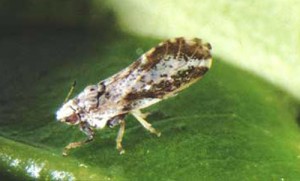

Citrus is a 9 billion dollar industry in Florida and anything that might threaten the citrus harvest is carefully monitored and managed, if possible. Unfortunately, the Asian Citrus Psyllid is part of a current threat.
In March of 2014, the Florida Times Union wrote a story on how the citrus crop this year is estimated to be one of the lowest harvests in the past fifteen years. They blame a bacterial disease called Huanglongbing, better known as citrus greening disease, for the decline. This disease has no cure and will eventually kill an otherwise perfectly healthy tree within five years time of first being infected.
Unfortunately, the Asian Citrus Psyllid spreads the citrus greening disease and is considered one of the reasons that the citrus industry is facing a distressing season. As part of a strategy to slow the transmission, citrus growers are treating for the Psyllid in widespread areas.
The psyllid is a very tiny little bug about 3-4 millimeters in size that has brown mottled wings. They are a grayish color with small brown markings and will either jump or fly if approached. It also feeds at an angle, so the backend will appear higher than the front end if seen on a leaf.
When the psyllid lays eggs, they often lay eggs on the youngest leaf sprouts or newly curling leaves. These eggs change color over time. They start as a very light pale color, then move to yellow and will eventually turn orange before the eggs hatch. In addition, you can often see these white curly strings left by young psyllids on the leaves. They may also appear waxy.
The psyllid itself does not kill a citrus tree and is, at best, an irritating little bug. Unfortunately, if a psyllid feasts on a tree already infected with the citrus greening disease, then goes to feast on a tree that is not yet infected, it will then infect that uninfected tree.
Due to the extreme damage that Florida is already experiencing with their citrus crop, it is extremely important to contact professional help should you see any hint of Asian Citrus Psyllid infestation. It is also important to notify the Florida Department of Agriculture that you are seeing signs of Psyllids in your backyard, especially if you live anywhere near orange or citrus groves.
There are treatment options for the psyllid and the professionals can provide you with the best treatment option for your situation.
